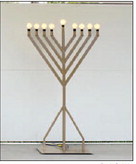LW Baptist
By Rolland Coburn
Pastor
It is the Christmas season, when we rejoice over the Christmas baby, the incarnation, our Lord’s birth. A friend once told me she accompanied her mother to the hospital in December when her sister was born and was impressed with the lifesized manger scene on display. She marveled to think how all the world celebrates the one whose birth was pictured there. The church’s great historian, Dr. Luke, author of both the Gospel and the Book of Acts, includes information found nowhere else. It is a good time to read Luke 1-2, which is known as the birth narratives, the documentary record of those events.
Luke speaks about the Gospel narrative’s absolute truth and trustworthiness (1:1-4). He tells his friend Theophilus about his research and interviews of eyewitnesses and says he has done so “that you may know the exact truth about the things you have been taught.”
Next, Luke tells how a baby was the answer to many prayers (5-17). He gives the time and place in history, and how God broke 400 years of silence to send the angel Gabriel to Zacarias the priest, offering incense and prayers for the people in the Jerusalem temple. Zacarias’ prayer for God’s people’s redemption was answered. Zacarias and his wife Elizabeth, though advanced in age, would nonetheless have a son, John the Baptist. Like the prophets of old, John would herald the coming of Israel’s and the world’s redeemer, Messiah-Jesus. The crowd waiting outside for Zacarias became witnesses of this event, and Judea’s hill country population spread the good news (65).
Then, in a striking way, Luke points out that our response to the Gospel means everything (18-25). Zacharias, earnest though he was in his prayers, found it hard to believe God’s promise, and was struck speechless, as a consequence until the birth of his son John. But his wife, Elizabeth, was overjoyed and embraced God’s word by faith.
Finally, Luke recounts how God revealed the father-son relationship in the trinity and his salvation-purpose for sending his beloved son to be born of a virgin and ultimately die on the cross (26-38). Six months into Elizabeth’s pregnancy, Gabriel brought this message to a virgin in Nazareth named Mary, engaged to Joseph, a descendant of king David. “The angel said to her, ‘Do not be afraid, Mary; you have found favor with God. You will conceive and give birth to a son, and you are to call him Jesus (i.e. salvation). He will be great and will be called the Son of the Highest. The Lord God will give him the throne of his father David, and he will reign over Jacob’s descendants forever; his kingdom will never end.’ ‘How will this be,’ Mary asked the angel, ‘since I am a virgin?’ The angel answered, ‘The Holy Spirit will come on you, and the power of the Highest will overshadow you. So the holy one to be born will be called the Son of God (30-35). And Mary said (38), ‘Behold, I am the Lord’s bondslave; may it be done to me according to your word.’” A recent writer summarizes, “the hope of Israel [and] God’s plan of salvation for the world has arrived in Jesus.” We are indebted to Gospel recorder Luke
for the details.




